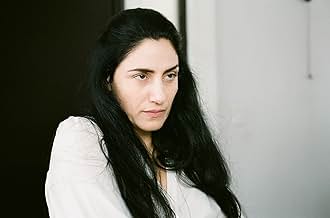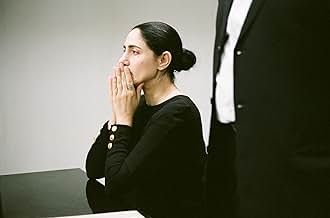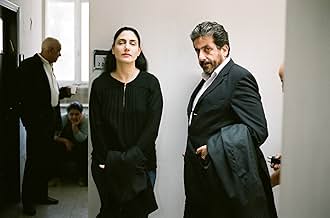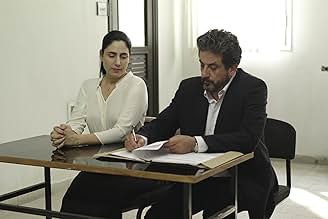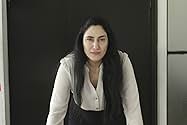Après plus de vingt ans d'un mariage sans amour, une femme fait appel à la compassion de son mari pour obtenir l'acte de divorce tant désiré devant un tribunal, ce qui se révèle plus diffici... Tout lireAprès plus de vingt ans d'un mariage sans amour, une femme fait appel à la compassion de son mari pour obtenir l'acte de divorce tant désiré devant un tribunal, ce qui se révèle plus difficile qu'elle pourrait s'y attendre.Après plus de vingt ans d'un mariage sans amour, une femme fait appel à la compassion de son mari pour obtenir l'acte de divorce tant désiré devant un tribunal, ce qui se révèle plus difficile qu'elle pourrait s'y attendre.
- Réalisation
- Scénario
- Casting principal
- Récompenses
- 15 victoires et 19 nominations au total
- Rabbi Shimon
- (as Sasson Gabai)
- Head Rabbi Salmion
- (as Eli Gornstein)
- Rabbi Abraham
- (as Roberto Pollak)
- Rachel Amzalleg
- (as Rubi Porat Shoval)
Avis à la une
This is the final piece to the creative siblings' trilogy on Israeli marriage that began with To Take a Wife (2004), and was followed by 7 Days (2008). That's right, the two characters of husband Elisha (Simon Ebkarian) and wife Viviane (played by director Ronit Elkabetz who was also in the excellent 2007 film The Band's Visit) have been followed through the stages of marriage, separation, and now divorce court. Only their divorce court is not what most of the world thinks of when we hear that term. In Israel, divorce is not a civil matter, but rather falls under Jewish law and the proceedings are overseen by a triumvirate of rabbinical judges. If that's not difficult enough to stomach it's the husband who holds ALL the power. The husband must agree to grant his wife the divorce. Without his permission, the judges can do nothing and the wife is bound to the marriage.
With the story unfolding almost exclusively in the bleak courtroom, Viviane trudges through delays, no-shows, desperate negotiations, and other time-wasters; only occasionally succumbing to an outburst, rather than her usual quiet dignity. Elisha maintains a seemingly proud and determined look when he does show for hearings, only periodically shooting a look of disgust at his wife. His confidence stems from the power in knowing that grounds for divorce do not include irreconcilable differences. The camera work puts us right in the courtroom and we soon recognize Elisha's mannerisms as not just passive-aggressive, but also manipulative and misguided. He is not an awful man, but this is an awful marriage.
Long a fan of courtroom dramas, I was mesmerized by the dumbfounding process as well as the stellar performances, excellent script and POV camera work. Ms Elkabetz is terrific as Viviane, and her work is complimented by Mr Ebkarian as her husband, Sasson Gabay as his brother and advocate, and Menashe Noy as her advocate and admirer. The film is a strange blend of hypnotic and infuriating and heart-breaking. It's uncomfortable to watch, but one we can't turn away from especially as Viviane shouts "You don't see me!" to the judges.
Winner of six Israeli Ophir Awards including Best Picture and nominated for a Golden Globe, Gett depicts the interviews and appointments Viviane has with the rabbinical court and the entire film takes place in the cramped courtroom or in the adjacent hallways. Viviane does not appear during the first few minutes as the camera focuses only on the men talking about her. She sits facing the judges and is only visible when she is being reprimanded for speaking without being spoken to. She needs no words, however, to convey the anguish clearly apparent on her face and in her gestures.
Though the trial stretches out for what seems like an endless period of time, the directors stated that similar trials may take three times as long. The dramatization of the extended trial starts and stops as we are notified by intertitles such as "three months later," "two months later," "one year later," and so forth until five years have passed. There are times when Elisha does not show up in court in spite of the rabbi's order and who threatens to revoke his driver's license, cancel his credit cards, and/or send him to jail but to no avail. If a husband refuses to grant his wife a divorce, the rabbis are powerless to force him.
Though Viviane has lived apart from him for four years and claims that they have not spoken during that time, the judges refuse to see that the marriage has gone past the point of no return and look for no solution other than having the couple remain together to try and "work it out." Witnesses are brought in to testify about Elisha being a good man (one calls him a saint) who even lets his wife go out alone. Even witnesses for the plaintiff say that Elisha has a good character. Represented by her articulate attorney Carmel Ben Tovim (Menashe Noy, Big Bad Wolves), Elisha is not accused of cheating, physical abuse, or lack of support, but only that, after thirty unhappy years of marriage, she no longer loves him and that they are incompatible.
While Elisha sits in distant silence, one witness claims that she heard Viviane yelling and throwing things inside the house. At that point Viviane says "It's easy to blame the one who yells. Those who whisper venom are innocent." It often seems as if Viviane is on trial rather than the issue of divorce. Elisha's brother Rabbi Shimon (Sasson Gabai, The Band's Visit) who is representing him, calls her a "wayward" woman and the judge takes offense when she unties the bun and lets her hair fall on her shoulders while another judge chastises her for speaking her mind. Brazenly, Shimon accuses Carmel of being secretly in love with his client and one witness testifies that she saw Viviane in a café talking to a man who was not part of her family.
As the trial drags on, it is clear that Elisha is simply not willing to let go and that he still loves his wife even if he defines it in his own terms. Gett has become a hot-button topic in Israel and is now being vigorously debated in both secular and religious circles. In fact, it mirrors a current case in New York where an orthodox rabbi has been accused of kidnapping husbands to coerce them through beatings and torture to provide a get to their wives. While there are no clear-cut victims and both characters are trapped in a heartbreaking situation, the film is a powerful indictment of archaic religious laws and traditions that make women second-class citizens. In the movie's most compelling moment, Viviane finally explodes in a torrent of rage and frustration, practically begging for her freedom. The rage and frustration is also ours.
Le saviez-vous
- AnecdotesRonit Elkabetz's final film before her death.
- GaffesVivian wears only one big ring on her forth finger of her left hand throughout most of the movie. Somewhere in the middle of the movie, Vivian is shown sitting at the bench in the "court" and there is also a second ring on her second finger.
- Citations
Viviane Amsalem: Why are you making me run around in circles? Why, Your Honor? Why? Why have I come in and out for years now and nothing's changed? Why? You can't force him to divorce nor to appear, and you can't this or that, and what about me? When will you see me? When I'm too exhausted to stand before you? When? If it were up to you, it could go on for 10 years. I could drop dead in front of you and all you'd see was him! But nobody is above the law. There's a God and there's justice and He'll judge you as you judge me. Mercilessly. You don't care about me!
- ConnexionsFeatured in 72nd Golden Globe Awards (2015)
Meilleurs choix
- How long is Gett?Alimenté par Alexa
Détails
Box-office
- Montant brut aux États-Unis et au Canada
- 988 150 $US
- Week-end de sortie aux États-Unis et au Canada
- 24 210 $US
- 15 févr. 2015
- Montant brut mondial
- 1 259 160 $US
- Durée1 heure 55 minutes
- Couleur
- Rapport de forme
- 1.85 : 1
Contribuer à cette page





